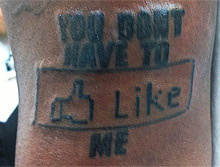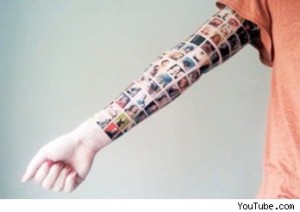
There is a video floating around the internet of a woman getting 152 of her closest Facebook friends tattooed on her arm, creating a full sleeve composed of tiny profile pictures that looks like a geometric checkerboard. As a scholar and an avid tattoo collector, I find this very illuminating.
For one, this reveals the increasing popularity of tattoos. Despite the vehement commentary one finds attached to stories like this (scroll down and read the comments if you want to feel angry), tattoos have become increasingly popular in urban environments and global cities like New York, London, Tokyo, Buenos Aires, and Amsterdam.
Second, and perhaps more germane to this blog, this case reveals the general merging of the digital and the material, fashioning an augmented reality that we all now share and may soon take for granted (or do we already take augmented reality for granted?). Nathan has already written on this topic extensively, especially with regards to the merging of the digital world and the physical world.
Thirdly, this case reveals the ubiquity of social networking sites (SNS) as an expression of our selves in an era of augmented reality. And this is where this specific tattoo is interesting. Where tattooing has long served as an expression of personal identity (see Hewitt 1997), SNS tattoos serve to blend these two mediums of self-presentation and identity work in new ways.
For example, T-Pain recently got a Facebook inspired tattoo that likewise plays testament to this trend. His use of the “Like” button is ironic, but totally in line with existing tattoo practices that use symbols of popular culture to make personal statements.
 This Facebook profile picture sleeve is an overt expression of the bearer’s social network, particularly her digital social network of her closest family and friends. As a unique form of self-expression, the tattoo grafts the digital social world onto the bearer’s material body, creating an augmented (cyborg) body.
This Facebook profile picture sleeve is an overt expression of the bearer’s social network, particularly her digital social network of her closest family and friends. As a unique form of self-expression, the tattoo grafts the digital social world onto the bearer’s material body, creating an augmented (cyborg) body.
For many people, social networking sites like Facebook and Myspace are integral to contemporary understandings of friendship and identity, and it is no wonder that someone took the time and money to permanently tattoo this network onto her body. But it begs to wonder, what are the limitations to this form of self-expression? In an era of increasing fluidity and change, do tattoos serve as a viable avenue for self-expression and identity work? It appears that most of the opposition to this tattoo comes from the seemingly tenuous character of many online friendships and the permanence of the tattoo medium. What do you think?

Comments 7
Gyurka Jansen — June 27, 2011
Rather than a 'unique form of selfexpression' the viral video was an ad for a company that offers this kind of friends-mosaic as a generic service. (The video actually says it's made by PrettySocial) ;)
There are tons of geek/computer/internet/social tats though: an old way of expressing a new aspect of everyday life. It does show the increasing popularity of tattoos as well, yes.
replqwtil — June 28, 2011
I was gonna say, "That sure makes it a lot harder to unfriend somebody!" But I feel as though that's a bit of a lark comment.
It is definitely an interesting phenomena, and I think it demonstrates admirably the fact that one's "online" network is not actually divorced in any way from one's "real" friends. As pointed out based on that most recent PEW data, almost everybody's friends on facebook Are their real friends! A great expression of that fact.
SNS Tattoos Redux: Branding and Lifestyle Consumption » Cyborgology — August 5, 2011
[...] as we might have expected, the much-tweeted Facebook sleeve tattoo that I wrote about before has turned out to be a hoax. More specifically, it was a marketing campaign for the company Pretty [...]